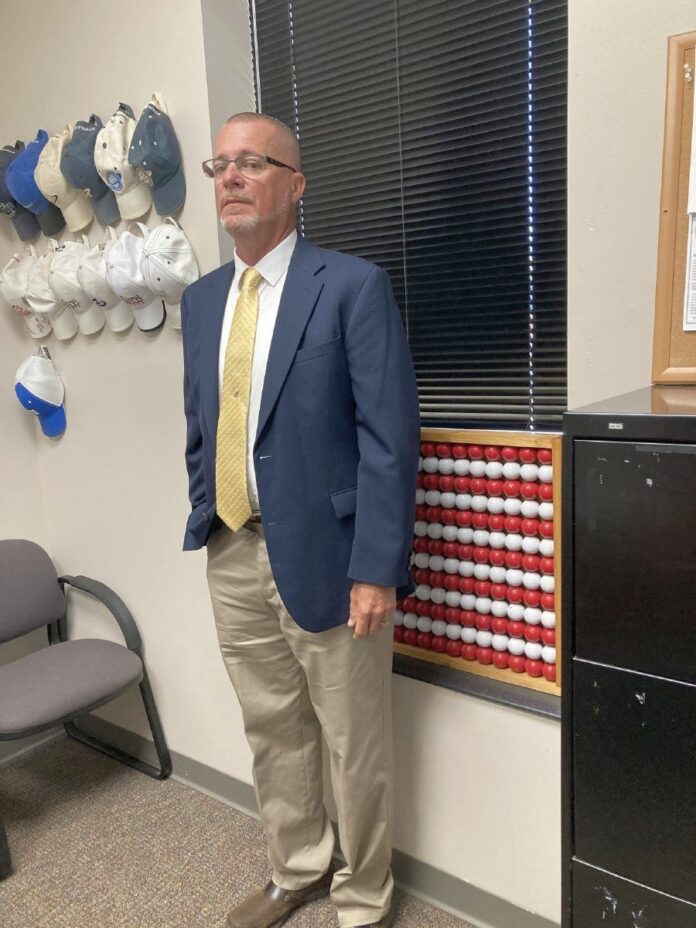
GREENFIELD — Wade Kennedy is moving up in Hancock County’s community corrections program. Kennedy, who was first employed by the county as a jail officer in 2010, has been the case manager for community corrections for the past four years. Now, he has been promoted to the top spot at a time of transition for the program.
Kennedy was recommended as the replacement for the program’s recently retired executive director Pat Powers. The county commissioners approved the move two weeks ago.
“We’re excited to get Wade on board and get the program on what he thought the direction should be,” said Greenfield Police Chief Jeff Rasche, who is also the president of the Community Corrections Advisory Board.
Kennedy, a Greenfield native who currently lives in Knightstown, said he was not expecting to get the job when he applied for the director position.
“I figured if I got an interview, that would be a win for me,” he said.
A search committee made up of board members conducted interviews with nine of the most promising of the 35 candidates. The top three choices were discussed with the full advisory board, who voted by an anonymous paper ballot for Kennedy.
Rasche said he believes Kennedy is a good choice to guide the department through a difficult period. As the former case manager, Kennedy has plenty of knowledge about community corrections. His job, for example, included interviewing everyone who entered the program.
“He’s got a really stable disposition about him. He really has a desire to support the offender,” Rasche said.
Hancock County Circuit Court Judge Scott Sirk headed the search committee for a new executive director. He said the position had a number of great applicants, from both inside and outside the pool of current community corrections employees, but Kennedy stood out.
“He literally knocked our socks off in the interview,” Sirk said.
Sirk said he was impressed by Kennedy’s knowledge of evidence-based treatment for offenders and commitment to collaborating with the county’s drug court.
Kennedy takes over the department at a time of transition. In May, Hancock County shut down its work-release program, which allowed some inmates to work a job while serving out their sentences.
Because of concerns about COVID-19, it was no longer safe for the county’s approximately 80 work-release participants to travel between their jobs and the community corrections center on Main Street. That meant the county could not continue to charge the fees to participate in the program. The participants were transferred either to home detention or to the county jail.
Fifteen county employees who helped run the program, eight of them full-time workers, lost their jobs.
The county’s home detention program is currently adding five to 10 inmates per week, Kennedy said. County officials said resuming work release is a top priority, and Kennedy agreed.
“One of my first things to accomplish is to work with the sheriff’s department, the county council and the commissioners to get the work-release program running again,” Kennedy said.
Hancock County Sheriff Brad Burkhart said he has already met with Kennedy to discuss how their two departments can collaborate. Burkhart first met Kennedy when Kennedy was working as a jail officer in the sheriff’s department.
“I think he’ll do a great job,” Burkhart said. “I appreciate that he came and talked to me.”
Burkhart repeated concerns he has expressed in previous meetings with county officials about re-opening the work-release program. He said offenders who are arrested for drug charges and sentenced to work release may not receive adequate treatment for their underlying addictions, setting them up to fail in attempts to stay sober.
“I would maybe like to see how programs inside the new jail would be able to work, maybe in place of the work-release program,” Burkhart said.
Kennedy said he understands the sheriff’s concerns, but he believes work release provides strong support for participants struggling with addiction, as well as other issues. Community corrections partners with Recovery Works, an addiction treatment provider, and Families First, a counseling service that offers help for addiction, anger management, couples counseling and more.
The organizations work to find the best program for each work-release participant, Kennedy said, and many enter intensive outpatient addiction treatment.
“Our responsibility to our clients and our belief is that we will not be the reason you fail in this,” he said.
Kennedy said he also wants to provide support to the employees of community corrections, who — along with colleagues in the county’s drug court — have made his transition to the director role an easy one so far.
“They’re good people, and they’re been through a lot with the pandemic. They’re doing a great job,” he said.
Kennedy attended college in West Virginia and then joined the Air Force. However, he said, he has always thought of Hancock County as home. He hopes the new position will give him the opportunity to make a difference in the community.
“I believe in this county and the people,” he said. “We’re team players. We want to do what’s best for Hancock County.”
